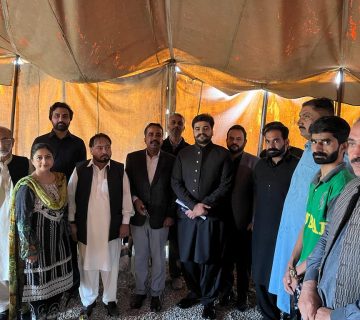UNITED NATIONS, Apr 13 (APP): Speakers at a UN forum — presided over by Pakistan — Wednesday called for producing affordable assistive technologies in helping people with disabilities live independent lives and exercise their rights and fundamental freedoms.
The call was made at a side event on the margins of the 56th session of the Commission on Population and Development at which a discussion took place on “Assistive Technology for Inclusive Development”. It was co-hosted by Pakistan, Antigua and Barbuda, Poland and the World Health Organization (WHO).
(Assistive technology is a piece of equipment, software programmes, or product system that is used to increase, maintain, or improve the functional capabilities of persons with disabilities.)
The speakers included representatives of member states, leading experts and people with lived experience. They highlighted the role of assistive technology in amplifying progress on inclusive population, education and sustainable development, ensuring no one is left behind.
WHO estimates that today 2.5 billion people need one or more assistive products. With a global aging population and a rise in noncommunicable diseases, this number will rise beyond 3.5 billion by 2050, with many older people needing two or more products as they age.
In his presidential remarks, Pakistan’s Ambassador to the UN, Munir Akram, said that the anti-poverty Sustainable Development Goals (SDGs) could not be achieved without fulfilling the unmet need for assistive technology to ensure social, political, and economic inclusion of millions of men, women, and children.
“There is an imperative need to demonstrate international solidarity, political commitment and to promote financial support to assistive technology and ensure the availability and affordability of assistive technology products, devices, and services especially for people living in developing countries.”
Noting that access to assistive technology is recognized as a human right in the Conventions on the Rights of Persons with Disabilities and the Rights of the Child, the Pakistani envoy said it was an essential element in improving the participation, inclusion, and quality of life for millions of people around the world.
Ambassador Akram also referred to a series of events organized by Pakistan to highlight the need for assistive technology and pointed out that WHO’s Global Ambassador on Assistive Technology is a Pakistani — Dr Sana Hafeez, a wheelchair user.
Despite being a developing country confronted with resource constraints and while grappling with recovery from the devastating floods caused largely by climate change, he said that Pakistan was committed to creating an inclusive society, one that enables the full participation of persons with disabilities, and other vulnerable segments, in the socio-economic life and development of the country.




No comment